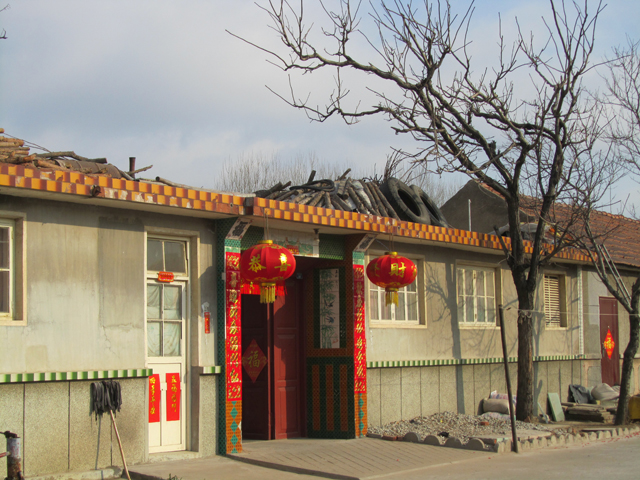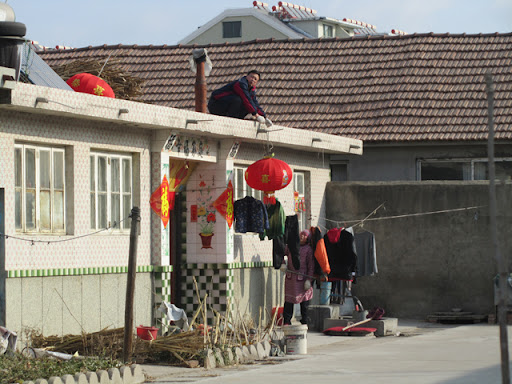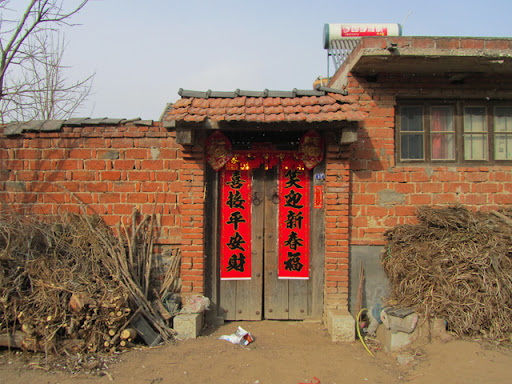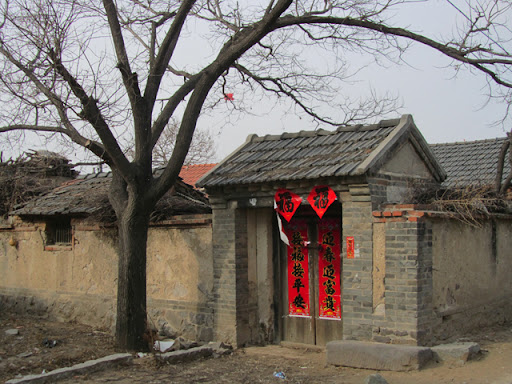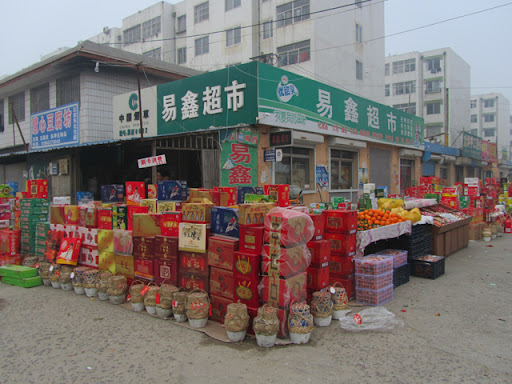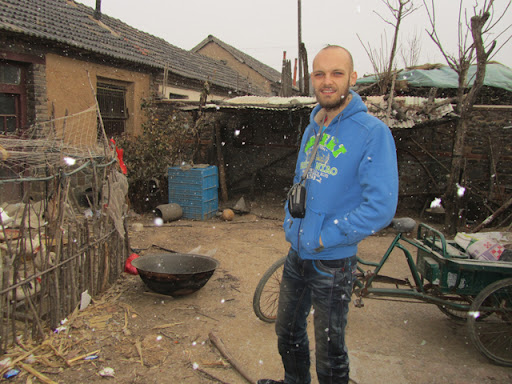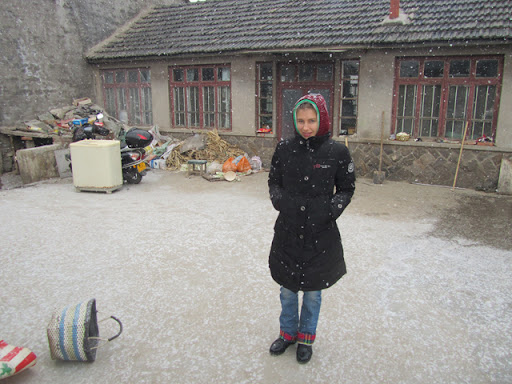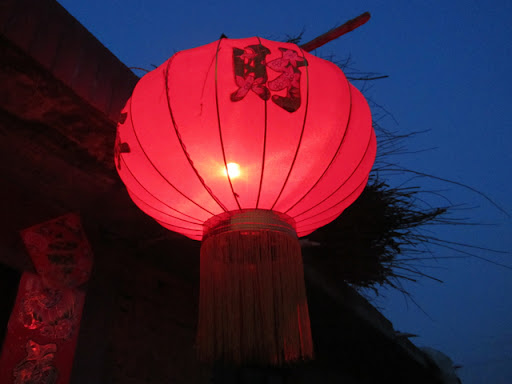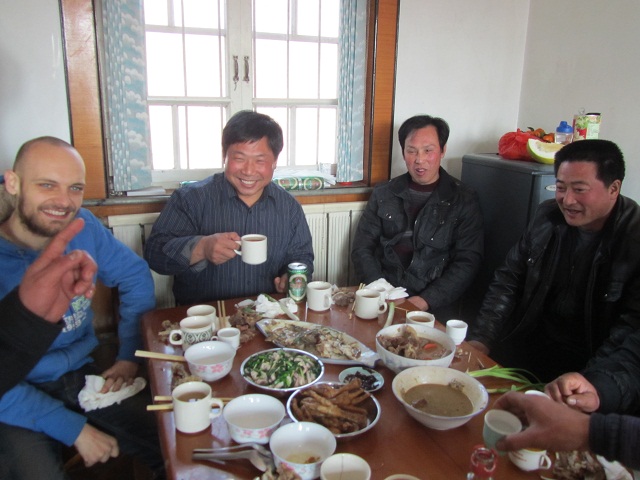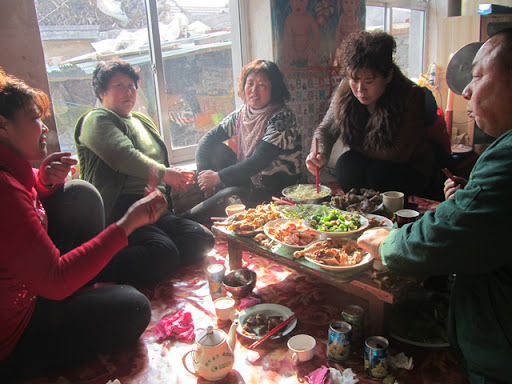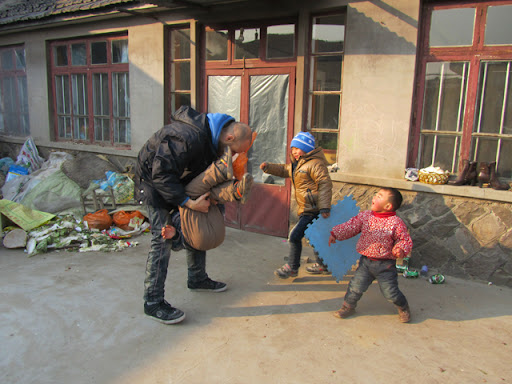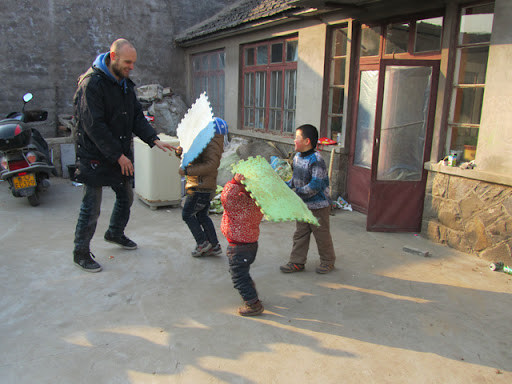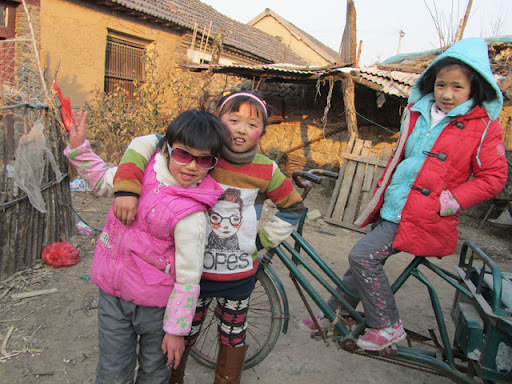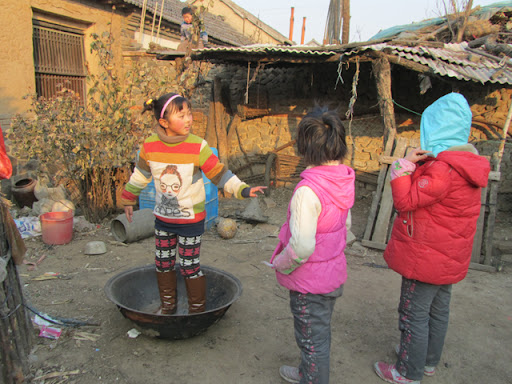Chinese New Year - a brief instruction manual to greeting it, based on the experience of two laowai stranded in a provincial city of China
First of all, if you are picturing dragons and lions marching through the streets at the energetic rhythm of drums and cymbals, the whole city drowning in red, delicious smells, deafening sounds and happy vibrations, your picture of the Chinese New Year is probably based on same movies as mine :-) The truth is, in a small provincial city of China and the rural area around it, at the time around the Chinese New Year it feels even quieter than usual, there are no spectacular public processions and all the delicious smells are confined to the borders of people's apartments. Actually, starting somewhere a week before the New Year the streets gradually fall into a kind of three-weeks lethargic sleep, with more and more businesses closing each day for the festivities and more and more people either going away to visit family or simply staying home to prepare for celebrations.
Now here's what you need to do when you are in China and the most-wanted holiday of the year finally arrives:
- First, make all the evil spirits that might have been co-habiting in your living space leave by thoroughly cleaning your house (even if you don't like to do it during the rest of the year :-) - apparently these spirits don't like hygiene.
- Then, put out two red lanterns at the entrance door (skip this step if you are one of the many urbanization victims and do not own a house - honestly, the lanterns will not fit at the door of your apartment).
- Next, carefully prepare the intricate schedule of social meetings you are about to plunge into. Make sure every single relative of your extended family is on the list, strictly ordered by age, part of the family (husband or wife, or rather husband before wife) and relation to you. Actually, not to mess it up, just take the traditional schedule of Spring Festival social visits and follow it without any deviations for every day of the following two weeks of festivities... Confucius would be so proud of the modern China :-).
- Now, this one's important: nobody in China really likes milk, but milk is supposedly good for your health, so whenever you are embarking on any one of those visits, be sure to get a pack of milk for your hosts from one of the multiple milk pack pyramids that get erected in front of small shops (the only businesses that do not get closed for the holidays). Well, variations over milk are possible, like beer or baijiu (Chinese rice liquer that tastes like bad tequila) for less health-aware visits. Other cool New Year presents for family are eggs, apples, home-made bread etc.
- Get up somewhere before 10 am. Do not have breakfast (save space!). Around 10 am start going to your hosts. On arrival, drop your milk in the local milk pack pyramid that's starting to grow at the house you are attending. Now hang out for a while (somewhere till 11:00 am) observing all the usual features of a Chinese prepation for celebration (men talking, women cooking, kids running around or watching "Happy sheep"). Try not to faint or choke on the saliva with all the smells coming from the kitchen. Don't worry - very soon your patience will be duly rewarded by the abundance of the feast that's about to begin. First, there will be a lot of meat dishes, and fish dishes, and other curious dishes. Then after you'd been eating for about an hour, it will be time for the vegetable dishes. And finally, at the end of this lunch you will be offered bread, bao, noodles or the so-called "fried sticks" - just in case you are still hungry after at least a dozen of dishes steadily consumed over the previous couple of hours. As you are busy consuming (or at least trying) all this overwhelming amount of food, notice that the women of the family have not left the kitchen in all this time (just an idle observation).
- It's about 1-2 pm now. Ok, now your further afternoon activities will depend on who you are:
- Ok, it's getting dark outside, the jiaozi are rolled and dinner's ready: take your seat at the table and start eating :-)! Don't be deceived by the fact that lunch is supposed to be the main meal of all the Chinese celebrations - the amount of dishes you'll receive for dinner and their variety will not be in any way inferior to those of lunch. Eat for another hour or so. Now it's quite late and you are exhausted. Time to say "bye" to your host family, thank them for having you and head home.
- Wake up the next morning, check your agenda on the subject of who you are visiting that day, take the milk and then repeat the steps from the day before (with only slight variations and only if really necessary).
- Keep doing this for about two more weeks.
- And last, but not least, every day of the three-weeks festivities keep setting off firecrackers, lots and lots of firecrackers! Make sure that you do it the whole day, regularly, otherwise the city will get too quiet and all the evil spirits will crawl back from their hiding places to spend the new year with you (you don't want that to happen, do you!!!). Now and then do something silly with the whole fire-cracker thing and either set yourself or your village on fire. In any case, do whatever it takes to keep all those people in the ambulances and fire-brigades occupied.
- Try not to panick if in the middle of the night you wake up to the sound of the deafening cannonade outside. It might feel like war so much that momentarily you might have difficulty remembering where you are. If that happens, just recite something in the style "It's not war, it's just Chinese New Year."
- Try not to think about all the trees that had to die to become all those milk cartons and other innumerable boxes and wrappings: if you think too much of it or do simple extrapolations, your heart might stop.
- Finally, get very resilient to the sound of war: the fireckackers will continue well into the third week of the new year, with the Spring Festival smoothly transitionining into the Lantern Festival with its share of firecrackers. And in the meantime all the businesses will start opening and celebrating this with more firecrackers, and then all of a sudden it's St Valentine's Day and some people still have some stock of firecrackers to celebrate their love for each other :-)!
- But most importantly, although it's not as breath-taking and crazy as you as might have imagined, enjoy this very cozy and happy family festival of the Chinese people. And maybe after the whole winter without snow on the very eve of the New Year, just when winter has to give way to spring, nature will make everybody wonder as all of a sudden it will start throwing big white flakes from the sky, as if trying to dress up the world for the most important event of the lunar year.
- And finally, DON'T TRAVEL - after all, the Chinese New Year is the biggest yearly migration of people in the world!
Then, here's a sample agenda for the visit days:
- If you are a Chinese woman from the host family or her close friend/relative, start cleaning the dishes from the lunch and once that's done, start preparing the food for dinner, including the most important dish for the evening meal - jiaozi, or dumplings. Jiaozi are considered to be the most important food for the Spring Festival as originally they were similar in shape to the ancient Chinese money (gold or silver ingots) and therefore symbolized wealth, but these days they are crescent-shaped. So roll the hundreds of neat crescent-shaped pieces that are necessary to feed all the people you are hosting that day. This should keep you busy for a couple of hours. After that you are all set to continue with all the washing, chopping, frying and serving in the kitchen.
- Ok, now if you are a Chinese man or a visiting Chinese woman, then go sit on the Kang (the traditional Chinese bed-stove that gets warm with the heat of the cooking fire in the adjacent kitchen) and chat or gamble (cards or dominoes) with your fellow men. Eat sunflower seeds or tiny mandarins during that process - that way you keep training your stomach for all the food you still need to consume later. If you are too tired, have a nap - with all the hard eating you've deserved it!
- If you are a Chinese kid, run around and play with your multiple cousins and friends. Ah, also from time to time receive some money from grown-ups - once this happens, make sure to loudly announce your current balance to all the kids so that they get really jealous over the fact that you are now 1 yuan richer than them.
- If you are a laowai (or foreigner), keep marvelling at all the curious things happening around you, alternatively play with the kids (kungfu fighting, finding the missing cats, climbing up the fence, joint trips to the local shop to stock up on goodies and the like are all ok) or help the Chinese women with all those jiaozi by contributing your hundred of ugly crescent-shaped pieces to the general pot.
Now if you are a foreigner, here are some additional instructions for this wonderful time of the year:
And here is a small photo report:
Lanterns:
"Welcome New Spring" signs on the doors:
Milk pack pyramids:
The first snow of the winter on the last day of the winter:
Birds of feather flock together, but what brought the dove and the ducks together :-)?
Eating (men, women and kids appearing according to the traditional hierarchy):
And jiaozi - one of the many trays:
Kungfu fight - everything goes as a weapon:
Other activities (roof climbing, bike-riding, candy consumption, wok swinging and more):
